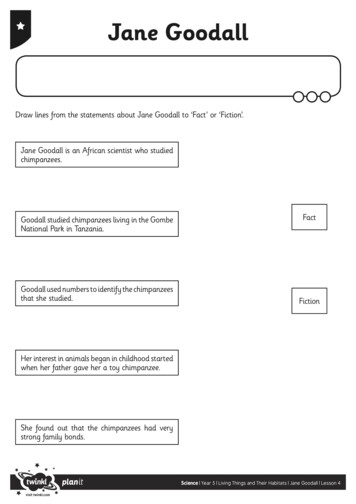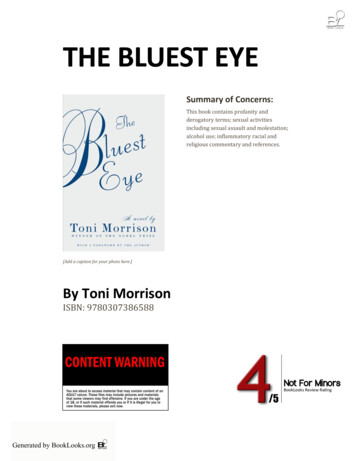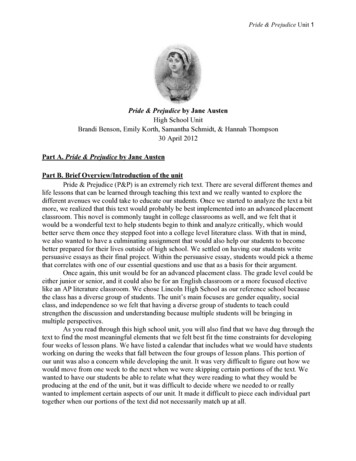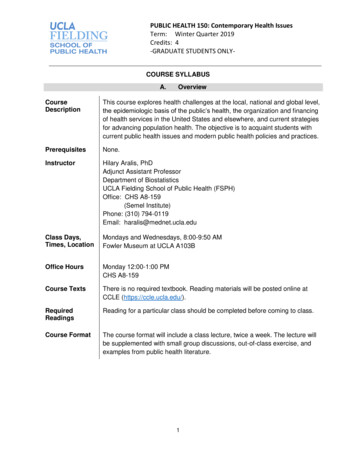
Transcription
Jane & Terry Semel Institute for Neuroscience & Human BehaviorPostdoctoral Fellowship Program in NeuropsychologyProgram Brochure2022-2023Table of ContentsINSTITUTIONAL MISSION. 2OVERALL POSTDOCTORAL FELLOWSHIP PROGRAM AIMS AND GOALS . 3GENERAL EXIT CRITERIA . 5SPECIFIC TRACKS . 5CLINICAL NEUROPSYCHOLOGY TRACK (GENERAL):. 7CLINICAL NEUROPSYCHOLOGY TRACK (CHILD): . 7GEROPSYCHOLOGY‐NEUROPSYCHOLOGY TRACK: . 7CLINICAL NEUROPSYCHOLOGY OF TRAUMA & RESILIENCE TRACK:. 8CLINICAL NEUROPSYCHOLOGY OF BRAIN INJURY AND SPORTS CONCUSSIONS TRACK: . 9CLINICAL NEUROPSYCHOLOGY OF NEURODEGENERATION TRACK: . 10HNCE CULTURAL NEUROPSYCHOLOGY PROGRAM (CNP) & HNCE BILINGUAL AND SPANISH INTERDISCIPLINARY CLINICALTRAINING (BASIC‐T) TRACKS: . 10CLINICAL NEUROPSYCHOLOGY RESEARCH TRACK:. 11PROGRAM ADMINISTRATIVE STRUCTURE AND RESOURCES . 12PRIMARY COLLABORATING DEPARTMENTS AT THE GEFFEN SCHOOL OF MEDICINE AT UCLA . 13COLLABORATING CENTERS OF EXCELLENCE . 13FACILITIES AND RESOURCES . 15CLIENT POPULATIONS SERVED . 15LIST OF FACULTY/SUPERVISORS. 15TRAINING ACTIVITIES . 17DIDACTIC CURRICULUM . 17FALL QUARTER . 17WINTER QUARTER . 19SPRING QUARTER . 22SUPERVISION . 24EVALUATION PROCEDURES . 24DUE PROCESS AND GRIEVANCE PROCEDURES . 25BENEFITS AND STIPEND . 26APPCN RELATIONSHIP . 26APPLICATION PROCEDURES . 26FACULTY PROFILES. 27Postdoctoral Fellowship in Neuropsychology Brochure (rev. 7/26/21)Page 1 of 47
Jane & Terry Semel Institute for Neuroscience and Human Behavior at UCLAPostdoctoral Fellowship Program in NeuropsychologyInstitutional MissionJane & Terry Semel Institute for Neuroscience & Human Behavior at UCLA(see also https://www.semel.ucla.edu/)The Jane & Terry Semel Institute for Neuroscience & Human Behavior (Semel Institute; previously knownas the UCLA Neuropsychiatric Institute) is an interdisciplinary research and educational institute devotedto the understanding of complex human behavior, including the genetic, biological, behavioral and sociocultural underpinnings of normal behavior and the causes, phenomenology, and consequences ofneuropsychiatric disorders. In addition to conducting fundamental research, the Institute faculty seek todevelop, evaluate, and disseminate effective treatments for neurological and psychiatric disorders, includingthe improvement of health service delivery systems, and the shaping of national health policy regardingneuropsychiatric disorders.The Semel Institute, in partnership with the Departments of Psychiatry, Neurology, Neurosurgery,Pharmacology, Human Genetics, Neurobiology and other cognate disciplines within the David GeffenSchool of Medicine at UCLA, and within the College of Letters and Science, provides an outstandingresearch and training environment for the study of neuroscience and behavior. The Institute's researchportfolio spans behavioral genetics, developmental and cognitive neuroscience, neurobiology, brainimaging, clinical research, health services, and policy research, and socio-cultural studies of humanbehavior and psychopathology. Across the life cycle, a broad range of psychiatric and neurologicaldisorders are studied intensively, including the psychoses, addiction, autism and developmental disorders,attention deficit disorder, mood disorders, epilepsy, dementia, demyelinating and cerebrovascular diseases.Stewart & Lynda Resnick Neuropsychiatric Hospital(see also https://www.uclahealth.org/resnick/)The Stewart & Lynda Resnick Neuropsychiatric Hospital, together with the Semel Institute and GeffenSchool of Medicine at UCLA, provide leadership in the treatment of neuropsychiatric and behavioraldisorders, in research to expand our knowledge of these common problems, and in education about theassessment and treatment of mental illness. The UCLA Resnick Neuropsychiatric Hospital is the flagshipclinical facility of the UCLA Department of Psychiatry and Biobehavioral Sciences. Clinical programs atthe Neuropsychiatric Hospital provide comprehensive care. The hospital has consistently ranked “Best inthe West” and in the top ten nation-wide by U.S. News and World Report and was judged to havedemonstrated “exemplary performance” by the Joint Commission on the Accreditation of HealthcareOrganizations (JCAHO) when they awarded us their highest accolade, Accreditation with Commendation.Three principal clinical divisions allow care to be tailored to differing concerns across the lifespan: The Division of Child and Adolescent Psychiatry provides care to those less than 18 years of age and tosome older individuals with problems that arise in youth, such as those with developmental disabilities.Dr. John Piacentini is Chief Psychologist for the Child Division.The Division of Adult Psychiatry addresses the clinical needs of adult patients and their families. Dr.David Wellisch is the Chief Psychologist for the Adult Division.The Division of Geriatric Psychiatry tends to the special needs of older adults. Dr. Linda Ercoli is theChief Psychologist for the Geriatric Division.Postdoctoral Fellowship in Neuropsychology Brochure (rev. 7/26/21)Page 2 of 47
Jane & Terry Semel Institute for Neuroscience and Human Behavior at UCLAPostdoctoral Fellowship Program in NeuropsychologyAll three of these age-oriented divisions provide care across settings from outpatient care through “partialhospital” or “day hospital programs” to inpatient programs including psychiatric intensive care. AllDivisions also provide consultation services to inpatients hospitalized at the UCLA Center for HealthServices (CHS), the surgical and medical hospital that adjoins the Resnick Neuropsychiatric Hospital.David Geffen School of Medicine at UCLA(see also https://medschool.ucla.edu/)The David Geffen School of Medicine (DGSOM) is an academic unit within UCLA Health thatprovides training in health specialties and governs the appointments of faculty. It encompassesboth basic science and clinical departments, and supports the education of medical students,medical residents, and postdoctoral trainees. The administration of Psychology internship andclinical postdoctoral positions transitioned to the General Medical Education (GME) office in theschool of Medicine in 2016, and now the Semel Institute Office of Education works together withthe DGSOM GME office to support our training programs in clinical psychology disciplines.Division of PsychologyThe Division of Psychology (previously known as the Division of Medical Psychology-Neuropsychology)spans the age-oriented clinical divisions noted above and provides leadership for the discipline ofPsychology within the UCLA Health system. The Division of Psychology is the principal administrativeentity governing the professional practice of psychology, and the education and training of psychologistswithin UCLA Health. The Psychology Division operates across the three major age-oriented clinicaldivisions of the Resnick Neuropsychiatric Hospital, the Ronald Reagan UCLA Medical Center, and MattelChildren’s Hospital, to assure consistent representation of Psychology in all clinical settings. The missionof the Division of Psychology is to assure that the delivery of psychological services adheres to the higheststandards of the profession, and to advance the educational and research missions of the Semel Institute,the Department of Psychiatry & Biobehavioral Sciences, and the Resnick Neuropsychiatric Hospital.The Resnick Neuropsychiatric Hospital and Semel Institute, in addition to the age-oriented clinicaldivisions, are organized into a series of key scientific centers and clinical initiatives. The Division ofPsychology operates the Medical Psychology Assessment Center (MPAC), a suite of offices, examinationand conference rooms on the ground floor (C-Level) of the Institute, including the Mensh AssessmentLaboratory, which is dedicated to comprehensive neuropsychological and psychodiagnostic assessment,and the Satz Conference Room, dedicated as a patient waiting area and lounge. The Mensh AssessmentLaboratory is named in tribute to the late Ivan N. Mensh and his late wife Frances. Professor Mensh foundedMedical Psychology in 1958 and served as its chief for 28 years. The Satz Conference Room is dedicatedto the memory of the late Professor Paul Satz, who served as the Chief of Neuropsychology from 1986 to2002. Professor Robert M. Bilder is currently the Chief of Psychology, having served in this role since2002, when the previously separate programs in Medical Psychology and Neuropsychology merged into asingle unified Division.Overall Postdoctoral Fellowship Program Aims and GoalsThe Postdoctoral Fellowship Program in Neuropsychology aims to prepare the next generation of scientistpractitioners for careers in academic research and clinical applications within the specialty area ofneuropsychology. The program achieves its aims through training in a series of tracks, including bothAcademic/Research and Clinician/Educator emphases. Tracks with an Academic/Research emphasis aredesigned to prepare applicants for academic careers in teaching and clinical research, and tracks withPostdoctoral Fellowship in Neuropsychology Brochure (rev. 7/26/21)Page 3 of 47
Jane & Terry Semel Institute for Neuroscience and Human Behavior at UCLAPostdoctoral Fellowship Program in NeuropsychologyClinician/Educator emphases are designed to prepare applicants for private or hospital-based practiceproviding neuropsychological services and advanced training in academic medicine focused on clinicalneuropsychology. All Fellows, regardless of track, will receive broad training and experience in bothresearch and clinical practice. The difference between tracks is their allocation of major rotation and electivetime. All tracks individually tailor the Fellow’s training plan to achieve these goals in light of the Fellow’sprior competencies and experiences.All tracks of the program maintain the explicit goal of preparing graduates to demonstrate advanced levelsof competency, skills, and knowledge as specialists in clinical neuropsychology, consistent with the APACommittee on Accreditation’s (CoA) standards for postdoctoral residencies. We designed theclinician/educator tracks specifically to embody the Houston Guidelines for Specialty Training in ClinicalNeuropsychology and to satisfy the criteria for board certification in Clinical Neuropsychology specified bythe American Board of Clinical Neuropsychology (ABCN). Satisfactory completion of this program aimsto satisfy requirements for postdoctoral supervised professional experience (SPE) necessary for licensurein the State of California, and contracts for SPE are established prior to the commencement of training.In the Clinician/Educator tracks, clinical service delivery occupies at least 50% of program effort. TheAcademic/Research emphasis tracks, in contrast, dedicate more than 50% effort to research. Specificcompetencies for all Fellows are assessed in the following areas:1. Ability to undertake consultation to patients and professionals on an independent basis. The delivery ofthese services clearly reflects the integration of current scientific evidence and theoreticalunderstanding of brain-behavior relations.2. Demonstrated research competence. Participation in research is a mandatory component of both ourclinical emphasis tracks and in the research track. In the clinical emphasis tracks, at least 10% effortmust be dedicated to research activities, and Fellows are expected minimally to demonstrate researchproductivity as manifest through publications, presentations, or other scholarly activities during eachyear of their fellowship. The level of expectation is determined during program design in conjunctionwith the individual fellow’s preceptor and other faculty. For the research emphasis tracks, more than 50%effort must be dedicated to research and productivity expectations are accordingly higher. A broadspectrum of research opportunities exists in laboratories throughout the University; a brief summary ofsome of our faculty members’ research interests is provided in a subsequent section.3. Eligibility for licensure in the state of California.4. Training eligibility for external certification in Clinical Neuropsychology by the American Board ofProfessional Psychology/American Board of Clinical Neuropsychology (ABPP/ABCN). This criterionis assessed by assuring that all Fellows receive adequate training and experience in basic neurosciences,functional neuroanatomy, neuropathology, clinical neurology, psychological assessment, clinicalneuropsychological assessment, psychopathology, and psychological intervention. Backgroundcompetencies in these areas are explicitly evaluated in the application review process, and Fellows’program design may include additional training in those areas where further development would bebeneficial. The experiences through which these competencies can be demonstrated are diverse, andmay include research, teaching, clinical services, and/or administration. Applicants may be acceptedinto tracks with research emphases even if they are not expected to satisfy all criteria for ABPP/ABCN,but those who aim to fulfill these criteria will be given preference.5. Fellows are evaluated to be competent practitioners in the areas designated by the Houston Conferenceon Specialty Training in Clinical Neuropsychology (Archives of Clinical Neuropsychology, Vol. 13,No. 2, pp. 157-220, 1998). These areas include assessment, treatment and interventions, consultation,research, and teaching and supervision. Our program endorses the competency model articulate by ReyCasserly, Roper & Bauer (Professional Psychology: Research and Practice, Vol. 43, No. 5, 422– 431,Postdoctoral Fellowship in Neuropsychology Brochure (rev. 7/26/21)Page 4 of 47
Jane & Terry Semel Institute for Neuroscience and Human Behavior at UCLAPostdoctoral Fellowship Program in Neuropsychology2012), including the foundational competencies described, and the benchmarks used to assesssuccessful achievement of these competencies. We have developed a unified set of competencybenchmarks for use across our training programs that follows on the work of Nelson and others.16. Knowledge of organizational, management and administration issues pertinent to neuropsychologicalservice delivery and practice, training, and research.7. Demonstrated commitment to the highest standards of professional conduct; knowledge of ethics andlaw relevant to the practice of clinical neuropsychology; and other standards for providers ofpsychological and neuropsychological services.8. Knowledge, understanding, and incorporation in professional practice, of issues of cultural andindividual diversity that are relevant to all of the above, and specifically to the impact of diversity onneuropsychological service delivery. Consideration of cultural and individual diversity is expected asa mandatory component of every assessment case. Our didactic curriculum is currently being revisedso that every lecture incorporates a learning objective focused on justice, equity, diversity and inclusion(JEDI). Our fellowship program, together with the Division of Psychology, Department of Psychiatry& Biobehavioral Sciences, David Geffen School of Medicine, and UCLA at large, are committed toovercoming systemic racism and we are actively engaged in action plans to promote JEDI principlesand to adopt anti-racist practices.General Exit CriteriaOur program aims to follow the Houston Conference on Specialty Education and Training in ClinicalNeuropsychology, which specified that postdoctoral trainees should satisfy the following exit criteria:1.2.3.4.5.6.Advanced skill in the neuropsychological evaluation, treatment and consultation to patients andprofessionals sufficient to practice on an independent basis;Advanced understanding of brain-behavior relationships;Scholarly activity (e.g., submission of results of a study or literature review for publication,presentation; submission of a grant proposal);A formal evaluation of the exit criteria 1 through 3 shall document competency in these domains,following benchmarks that are reviewed by trainees with their preceptors, and with input from othersupervisors;Eligibility for state or provincial licensure or certification for the independent practice ofpsychology (in our case, for the State of California):Eligibility for board certification in clinical neuropsychology by the American Board ofProfessional Psychology.We note that while eligibility for board certification in clinical neuropsychology by the American Boardof Professional Psychology is among our exit criteria, the program cannot guarantee eligibility noradmission to the Board.Specific TracksPlease note: The “2022-2023 Academic Year” refers to a period of training that is expected to1Adapted from Nelson, A. P., Roper, B. L., Slomine, B. S., Morrison, C., Greher, M. R., Janusz, J., . &Whiteside, D. M. (2015). Official position of the American Academy of Clinical Neuropsychology(AACN): Guidelines for practicum training in clinical neuropsychology. The Clinical Neuropsychologist,29(7), 879-904; and American Psychological Association. (2015). Guidelines for clinical supervision inhealth service psychology. The American Psychologist, 70(1), 33; with additional input from CarolFalendar and forms developed at the University of New Mexico Training Clinic.Postdoctoral Fellowship in Neuropsychology Brochure (rev. 7/26/21)Page 5 of 47
Jane & Terry Semel Institute for Neuroscience and Human Behavior at UCLAPostdoctoral Fellowship Program in Neuropsychologybegin between July 1st, 2022, and September15th , 2023. While we generally encourage applicantsto begin training as early as possible to coincide with the medical school calendar, it isacknowledged that many trainees come from internship programs with a different schedule,making a July 1st start-date impossible. The program thus establishes start dates on an individualbasis, with the understanding that the start and end dates for a training year may differ acrosstrainees, but in every case the training year is expected to continue for a complete calendar year.Applicants should also note that while the postdoctoral training experience in our program isintended to span a two-year period, training contracts are always for a one-year period, withrenewal for the 2nd year based on satisfactory progress in the program and availability of funding.Please note. All tracks are listed below. Only the following six (6) tracks are anticipated to beaccepting applications for the 2020-2021 academic year, pending availability of funds:- Clinical Neuropsychology Track (General)- Geropsychology-Neuropsychology Track- Neuropsychology of Stress, Trauma and Resilience- Hispanic Neuropsychiatric Center of Excellence (HNCE) Cultural Neuropsychology (CNP)Track- Hispanic Neuropsychiatric Center of Excellence (HNCE) BASIC-T Track- Clinical Neuropsychology Research TrackClinical emphasis tracks include the Clinical Neuropsychology Track (General), Clinical NeuropsychologyTrack (Child), Geropsychology-Neuropsychology Track, Clinical Neuropsychology of Trauma &Resilience Track, Clinical Neuropsychology of Sports Concussions and Head Injury Track, the MPAC –Neurodegeneration Track, the HNCE CNP Track, and the HNCE BASIC-T Track.Our research emphasis track is the Clinical Neuropsychology Research Track. Please note that the ResearchTrack operates to provide supervised professional experience in clinical neuropsychology to trainees whohave separate funding sources (see more complete description of this track below). Fellows in the researchtrack participate in the overall training program and are generally expected to satisfy the same competencybased exit criteria proposed for our clinical tracks, even though they will usually spend less than 50% oftotal effort in direct clinical service activities.Applicants are encouraged to contact the Division of Psychology Administrative Specialist (JenniferHaydn-Jones [jhaydn@mednet.ucla.edu], the Program Director (Robert M. Bilder, Ph.D., ABPP-CN[rbilder@mednet.ucla.edu]), and/or the individuals who are designated as Track Coordinators, with anyquestions about the individual track offerings. While this brochure is concerned only with the offeringswithin this program, where Neuropsychology is the primary focus, there are many additional opportunitiesfor psychologists to obtain post-doctoral training at UCLA. Details about some of these offerings, whichspan both basic and clinical neurosciences, are available a.edu/fellowships/clinical/It may also be possible to coordinate participation in other programs throughout UCLA with selectedofferings from our Neuropsychology programs; interested individuals should contact Dr. Bilder and/or thedirectors of the other relevant programs for more information.Postdoctoral Fellowship in Neuropsychology Brochure (rev. 7/26/21)Page 6 of 47
Jane & Terry Semel Institute for Neuroscience and Human Behavior at UCLAPostdoctoral Fellowship Program in NeuropsychologyClinical Neuropsychology Track (General):This track is the broadest of the tracks with a primary clinical emphasis and is designed to prepare itsgraduates for the independent clinical practice of neuropsychology as a specialty. It is particularly designedfor those committed to providing such services in academic settings, and who seek to pursue advanced levelsof competency to play roles in the supervision and training of future clinical neuropsychologists. Trainingopportunities, typically expected to be of two years’ duration, are offered both within the Geffen School ofMedicine and at closely affiliated sites. Clinical fellows conduct both outpatient and inpatient diagnosticevaluations with a broad range of patients referred from Neurology, Psychiatry, Neurosurgery, Geriatrics,Infectious Diseases/Immunology, Surgery/Organ Transplant, Orthopedics, Pediatrics, Genetics, Radiologyand Medicine. Experience with forensic neuropsychology cases may also be provided. While the majorityof work focuses on adult cases, experience with child and geriatric cases may be included, and for wellprepared candidates (i.e., those who possess solid background and experience in both adult and pediatricneuropsychology), a Lifespan focus can be arranged. Fellows can gain exposure to brain mapping methodsfor presurgical planning using functional MRI and other neurodiagnostic tools and obtain significantexpertise on consultation to neurology and neurosurgery services. Fellows are active participants inevaluations conducted within the epilepsy surgery center and while this experience is available to alltrainees, often one of our fellows elects to specialize in epilepsy to gain further experience in presurgicalneuropsychological evaluations, intracarotid sodium amobarbital procedures (Wada tests), intra- and extraoperative cortical mapping, and participation in multidisciplinary team conferences. The general trackfellows see a broad range of additional cases with neuropsychological consequences of cerebrovascular,neoplastic, and traumatic etiologies. Fellows in this track also receive special training and experienceconducting advanced psychodiagnostic assessment in complex neuropsychiatric syndromes, both foroutpatients and on the inpatient services of the Resnick Neuropsychiatric Hospital. Graduates of this trackare thus prepared to serve diverse assessment needs in consultation to the broadest possible range of healthcare providers. There are currently two fellows in this track, and we anticipate having one openingfor 2022-2023. For further details about this track contact Robert Bilder, Ph.D., ABPP-CN(rbilder@mednet.ucla.edu) or Patricia Walshaw, Ph.D (pwalshaw@mednet.ucla.edu).Clinical Neuropsychology Track (Child):For applicants interested in specialty training in Child Neuropsychology, placements are offered incollaboration with The Help Group, a state-of-the-art facility dedicated to serving young people with specialneeds related to autism spectrum disorder, learning disabilities, ADHD, developmental delays, abuse andemotional difficulties (for further details, please see our Program Brochure, Collaborating Centers ofExcellence). Fellows in this track typically spend three days per week at The Help Group’s nearby ShermanOaks Campus, providing neuropsychological assessments under the supervision of UCLA faculty whospecialize in child clinical neuropsychology. Two days per week are spent at the UCLA campus inWestwood, seeing patients under the aegis of the Medical Psychology Assessment Center, and participatingin the extensive didactic offerings with other trainees. Fellows gain experience in assessment of childrenwith a wide range of clinical conditions including ADHD, learning disabilities, autism spectrum disorder,traumatic brain injury, and epilepsy; there are opportunities at UCLA for fellows to participate inpresurgical assessments, including Wada testing, intraoperative mapping, and presurgical fMRI.Opportunities to participate in research are also available. There is currently one fellow in this track. Wedo not anticipate having any openings for the 2022-2023 academic year. For further details about thistrack contact Claudia Kernan, Ph.D. hology Track:Postdoctoral Fellowship in Neuropsychology Brochure (rev. 7/26/21)Page 7 of 47
Jane & Terry Semel Institute for Neuroscience and Human Behavior at UCLAPostdoctoral Fellowship Program in NeuropsychologyThe goal of the geriatric psychology/neuropsychology track is to provide an in-depth training experiencefor individuals wishing to specialize in academic geriatric psychology and geriatric neuropsychology, andspecifically to develop psychologists to be expert geriatric clinicians as well as clinical researchers. To meetthese goals, this program is designed to provide well-rounded clinical training in a broad range of skillsapplicable to the geriatric patient, including geriatric neuropsychology, consultation/liaison service forinpatients, individual psychotherapy, group therapy for patients with depression and anxiety, cognitiveenhancement intervention and caregiver support. The patients seen include a broad cross-section ofdiagnoses. The fellowship includes a bi-weekly reading/discussion group on anti-racism with a focus on clinical care, researchpractices and professional development. The majority of patients seen for neuropsychological evaluations have mildcognitive impairment or dementia (e.g. vascular, neurodegenerative, encephalopathy), many
Postdoctoral Fellowship Program in Neuropsychology Postdoctoral Fellowship in Neuropsychology Brochure (rev. 7/26/21) Page 3 of 47 All three of these age-oriented divisions provide care across settings from outpatient care through "partial hospital" or "day hospital programs" to inpatient programs including psychiatric intensive care. All










